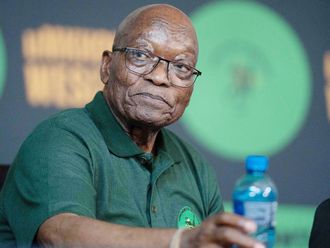
KANO, Nigeria: Nigeria has recently trumpeted a major victory in its battle against Boko Haram, claiming that its army has routed the jihadists from their forest bastion, but the war against them is far from over.
After years of devastating battles and a recent surge in attacks, the fear in Nigeria is that Boko Haram will simply decamp from the Sambisa forest enclave to other areas nearby.
Nigerian President Muhammadu Buhari announced on Christmas Eve that a months-long campaign had led to the “final crushing of Boko Haram terrorists in their last enclave in Sambisa Forest”.
The Nigerian military said troops were chasing fleeing Boko Haram militants, claiming that the fight against the jihadists was in its final stages.
But on Thursday, Boko Haram’s elusive leader Abubakar Shekau appeared in a video to dispute the government’s claim.
“We are safe. We have not been flushed out of anywhere,” Shekau said in the 25-minute video, flanked by masked armed fighters.
As access to the conflict zones is heavily restricted, claims from both sides cannot be independently verified.
According to a military source who asked not to be named, Boko Haram jihadists have been “tremendously weakened and are trying to avoid confrontation ... by hiding in some obscure locations”.
Islamists routed from Sambisa have reportedly fled to areas on the edge of the forest, islets on Lake Chad as well as villages on the Cameroon border.
“They were sighted in large numbers in ... the Kala-Balge area,” said a vigilante helping in the fight, referring to a region near Cameroon.
The head of the fishermen’s union in Borno state, the epicentre of Boko Haram’s seven-year insurgency, said some fighters had regrouped on the Lake Chad, which straddles Nigeria, Niger, Cameroon and Chad.
It provides the jihadists with a “convenient sanctuary”, with its 400 islets covered with dense vegetation that makes aerial detection and ground operations dangerous, Abubakar Gamandi said.
“The islets are between one and two square kilometres and the fresh water and abundant fish in the lake make them habitable,” said Gamandi, who has fished in the Lake Chad for 40 years.
Abu Musab Al Barnawi, the leader of a Boko Haram faction recognised by Daesh, has already been living on the lake since his group split from Shekau’s leadership in August, residents and vigilantes say.
Should Shekau and his troops move there, it is unclear whether the two rival factions will end up battling each other.
Cameroonian troops have intensified their operations along their nation’s frontier with Nigeria, where fleeing Boko Haram fighters have also sought refuge, according to a vigilante in the Nigerian border town of Banki.
“Cameroon has upped security along the border which has forced fleeing Boko Haram (fighters) to head to Kala-Balge, where Nigerian troops are deploying”, said the vigilante, who did not want to give his name.
“Kala-Balge may be the next battleground,” said Umar Ari, a local trader.
According to Yan St-Pierre, an expert on jihadist groups, cooperation between West African governments fighting Boko Haram has “vastly improved since September.”
However, “the army’s biggest problem is to secure the areas it recaptures from Boko Haram,” he added, referring to a spike in suicide and other guerrilla-style attacks unleashed since the jihadists began to lose ground.
Even though the Nigerian authorities have claimed several times that the end of Boko Haram was imminent, the conflict has merely continued to shift and “the army remains far from gaining the upper hand.”
How Shekau escaped from Sambisa remains a mystery.
He “might have escaped in the intense battle to take over Camp Zero,” an army source told AFP, referring to the last jihadist bastion in Sambisa Forest to fall to Nigerian troops.
He has since been spotted in Pulka village near Gwoza on the Cameroonian border — and is currently believed to be hiding in a forest in Kala-Balge, a security source said.
Shekau’s fighters are believed to have taken with them scores of Chibok girls held since 2014, as well as Nigerian army hostages, to use them as human shields.
Despite the odds, Nigerian troops remain defiant.
“We are closing in on Shekau and his remaining commanders,” said a military officer speaking on condition of anonymity.
“It is just a matter of time before we get him, dead or alive.”












